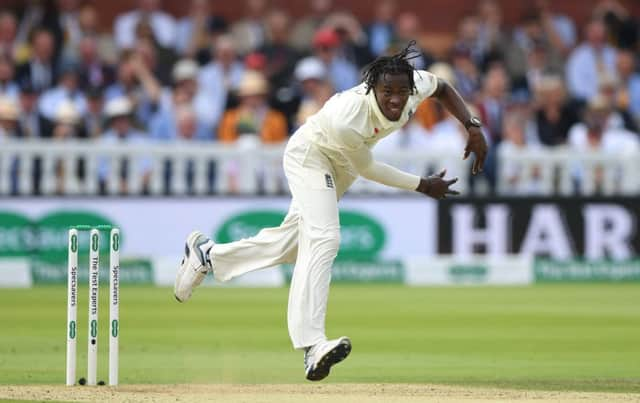Roddy Smith: Jofra Archer delivers timely bounce for Test cricket


Bowling consistently above 90 miles an hour, in a skilful, aggressive and hostile manner, the Bajan ironically brought back memories of the great West Indian bowlers from the eighties. The agile and languid run-up gives the unsuspecting batsman no warning of the thunderbolts he is about to send down. Although it is obviously far too early to make predictions about his future, there is no doubt that England have found themselves a huge talent and a fast bowler who could make their attack formidable for years to come, especially as their leading wicket-taker of all time and talisman of the last decade James Anderson nears the end of his career.
However, Archer did remind us of the dangers modern-day batsmen face. Although helmets have improved considerably in recent years, especially since the introduction of neck guards, Smith was struck a sickening blow that resulted in delayed concussion. Smith, batting as brilliantly as he had in the first Test, chose not to wear a neck guard as it felt uncomfortable. I am sure they will now become mandatory. With Smith, one of the world’s top players, being unable to cope with Archer’s pace, you have to fear for the ability of lesser players to protect themselves.
Advertisement
Hide AdAdvertisement
Hide AdEver since the tragic death of Phil Hughes in 2015 in a similar incident, the issue of player safety has been high on the agenda. However, when you are 22 yards away from a hard ball coming at you at 90 miles an hour with only a wooden bat for help, there will always be potential dangers irrespective of the quality and technical advances in protective equipment.
The one thing the sport cannot do is reduce the ability for bowlers to intimidate batters and use the bouncer as both a wicket-taking and a surprise delivery. Smith, the dominant player in the Ashes so far, will now miss the next Test to recover. The decision, albeit absolutely right, is one that may have a decisive effect on the outcome of the Headingley Test. Time will tell.
News also broke last week that the Euro T20 slam has been postponed for this year. This is a major setback for the European countries involved and especially their professional players. There has obviously been a huge amount of work undertaken by the governing bodies in Ireland, Scotland and the Netherlands to bring the event to this late stage, only to be thwarted, it seems, by financial issues with the key investors.
The event, similar to the recent Global T20 in Canada which was also subject to financial issues, is primarily a made-for-television event to be beamed back to Asia. Having dealt with television contractors, sponsors and investors from this market in the past when Scotland ran the Friendship Cup match between India and Pakistan in 2007, I know only too well how problematic this can be. We can only hope that issues are sorted out and it can be launched next year. Scotland’s top players desperately need events such as this to supplement other cricket income to make their chosen career viable.
You have to applaud the countries involved for taking the obvious risk to become involved in this project to support the marketing and growth of the professional game, and I hope the time and effort come to fruition in due course. Sourcing commercial opportunities for the sport outwith the top few countries is not easy and every opportunity needs explored with due diligence, especially when the investors and core audience are not based or directly associated with the countries involved.
Maybe a further year to plan, promote and make the competition financially viable will eventually be seen as a positive, although I am sure much work will need to be done to restore faith and entice the world’s leading T20 players to commit again. I hope we have not missed our opportunity.
Scotland’s players have just completed four ODIs in Aberdeen as the first games in the new ICC Cricket World Cup League 2. Barring one loss to Oman, they will be relatively happy with the series. Over 36 games in the league Scotland should, and I believe will, come out on top although not just Oman but also the UAE and the United States will challenge them.
The series showed again that Kyle Coetzer is unquestionably the best batsman produced by this country in many generations. Scores of 56, 96 and 62 (forgetting his first-ball duck) back up successful runs in recent T20s and ODIs. Now averaging in the mid-forties across 55 ODIs, his record stands up favourably with any player past or present.
Advertisement
Hide AdAdvertisement
Hide AdShane Burger will be hoping Kyle can remain fit and focussed through the next three or four years as his prowess and recent record simply cannot be replaced.
The games were most noticeable, however, for Scotland fielding a bowling attack made up of four frontline spinners and one main seam bowler. This surely can never have happened previously. You would expect that a team may use this tactic playing in the sub-continent on dustbowl pitches, but to do so in Aberdeen in the middle of a wet summer is truly extraordinary. The tactics worked well on the wickets they were presented with and it was either both a tactical masterstroke and cunning plan forged well ahead of time by the Scotland camp, or more plausibly a stark necessity on over-prepared pitches.
l Roddy Smith was chief executive of Cricket Scotland from 2004 to 2014.